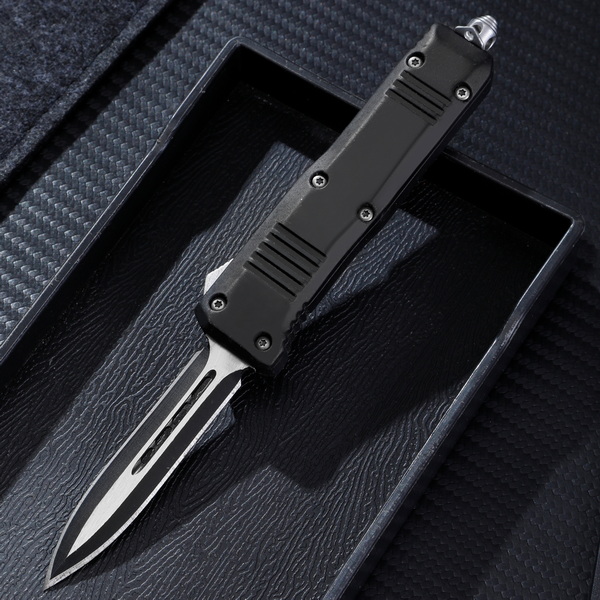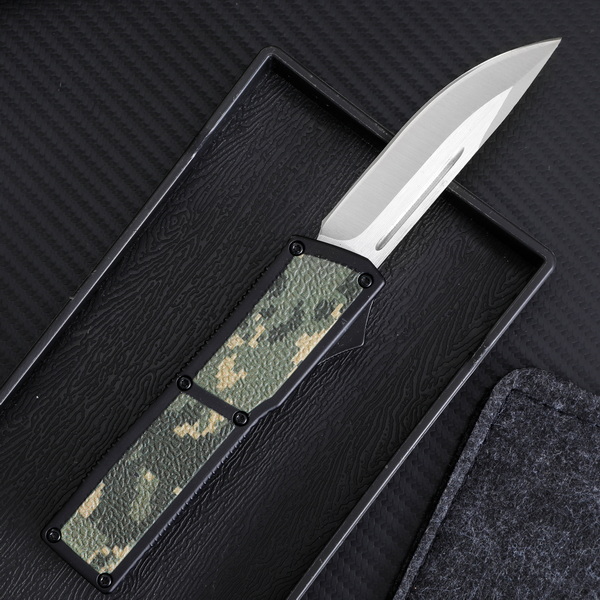Views: 222 Author: Loretta Publish Time: 2025-09-30 Origin: Site











Content Menu
● Why Authentic Outdoor Gear Matters
● Common Types of Outdoor Gear Prone to Counterfeiting
● How to Spot Fake Outdoor Gear
>> Inspect Brand Logos and Labels Closely
>> Examine the Quality of Materials and Craftsmanship
>> Compare Packaging and Documentation
>> Beware of Unrealistic Discounts
>> Purchase from Authorized Dealers and Official Websites
● How to Choose Authentic Outdoor Products
● The Role of OEM in Outdoor Gear Manufacturing
● Technological Tools to Detect Fake Outdoor Gear
● Key Features to Observe in Popular Outdoor Gear Categories
● What to Do If You Suspect Counterfeit Outdoor Gear
● FAQs
>> 1. How can I verify if an outdoor knife is authentic?
>> 2. Are all products sold on popular marketplaces genuine?
>> 3. Can counterfeit outdoor gear pose safety risks?
>> 4. What does OEM mean in the outdoor gear industry?
>> 5. Is there any app to check outdoor gear authenticity?
In the world of adventure, having reliable outdoor gear is crucial. From hiking knives to camping stoves and waterproof jackets, genuine equipment ensures safety, durability, and peak performance. Unfortunately, counterfeit outdoor gear has flooded the market, posing risks to outdoor enthusiasts everywhere. This comprehensive guide will help you spot fake outdoor gear and choose authentic products that can be trusted on your next excursion.

Investing in authentic outdoor gear means investing in your safety and comfort. Counterfeit products may look identical to genuine ones but often fall short in quality, durability, and safety standards. Faulty climbing ropes, unreliable knives, or poorly insulated jackets can lead to accidents, injuries, or gear failure at critical moments. To get the most out of your outdoor adventures, consume outdoor gear that meets rigorous quality standards.
Authentic gear also offers superior performance in extreme conditions, whether you are trekking in the cold or navigating rugged terrain. Brands that specialize in outdoor equipment subject their products to thorough testing to ensure their gear withstands harsh environments and extended use.
Many popular gear categories attract counterfeiters due to high demand and brand reputation. These include:
- Knives and multi-tools
- Backpacks and hiking bags
- Tents and sleeping bags
- Outdoor apparel (jackets, boots, gloves)
- Navigation devices and headlamps
Counterfeiters target these items because they often carry recognizable logos and can be sold at a premium price. Knowing the typical signs of fakes in these categories can help you avoid costly and unsafe mistakes.
Identifying counterfeit gear requires attention to detail and awareness of common red flags. Here are practical tips that will help you differentiate authentic gear from imitations.
Counterfeiters often overlook the finer details in logos, fonts, and label placements. Look carefully for:
- Spelling errors or inconsistent fonts
- Misaligned logos or thread colors on labels and patches
- Missing or poor-quality authenticity tags and holograms
Authentic products typically have consistent and precise branding details. Familiarize yourself with how the official brand's logo and labels appear before purchase.
One of the most reliable indicators of a fake product lies in its build quality. Things to examine include:
- Stitching that is uneven, loose, or frayed
- Cheap or flimsy zippers, buckles, and fittings that feel fragile
- Rough edges on metal parts or materials that feel thin and weak
High-quality outdoor gear manufacturers prioritize durability and robustness to withstand demanding outdoor conditions.
Authentic products generally include well-designed packaging, comprehensive manuals, and warranty cards.
- Inspect printed materials for clarity; counterfeit products often use low-resolution printing or poor-quality paper.
- Check for barcodes or serial numbers and verify with the manufacturer whenever possible.
Packaging is a reflection of the brand's professionalism and commitment to quality.
If a deal looks too good to be true, it probably is. Authentic outdoor gear tends to have stable retail prices.
- Be skeptical of sellers offering extremely low prices, especially in bulk.
- Deals from unauthorized sellers or suspicious online marketplaces should be approached with caution.
Price can be a clear red flag indicating counterfeit products.

The safest route to securing authentic outdoor gear is to buy directly from official brand outlets, authorized distributors, or trusted wholesalers.
- Confirm that the seller is listed on the brand's official website.
- Look for verified online stores with secure payment methods and positive customer feedback.
Authenticity guarantees and customer support generally accompany purchases from reputable sources.
Buying genuine outdoor gear is about combining research, verification, and trust in reliable sources. Follow this expanded checklist to make informed purchases:
- Study the specific product model and its features on the official brand website, familiarizing yourself with product details.
- Ask for product certifications such as ISO (International Organization for Standardization) or ASTM (American Society for Testing and Materials) to guarantee quality.
- Read customer reviews from verified buyers to understand performance and durability.
- Use secure payment methods like credit cards or trusted digital wallets that offer buyer protection.
- Avoid peer-to-peer sales without proof of authenticity or proper warranties.
OEM, or Original Equipment Manufacturer, is a vital process in the outdoor gear industry that ensures products meet exacting quality and design criteria set by international brands. As a leading Chinese factory, Yangjiang Ruizhen Industry and Trade Co., Ltd. provides high-end OEM services for foreign brands, wholesalers, and manufacturers, which:
- Ensures the use of high-grade materials and advanced manufacturing techniques
- Maintains stringent quality control to meet international outdoor safety standards
- Enables customization of designs based on client specifications without compromising authenticity
Working with a reputable OEM partner guarantees that the products hitting the global market are genuine, reliable, and durable, helping to prevent the spread of counterfeit outdoor gear.
Technology has increasingly taken center stage in verifying the authenticity of products. Consumers are empowered with innovative tools, including:
- QR Codes: Many brands embed unique QR codes on their products, linking buyers to official registration and verification sites.
- Mobile Authentication Apps: Smartphone apps can scan serial numbers or barcodes to confirm if the product matches records of the legitimate manufacturer.
- Augmented Reality (AR) Verification: Some brands use AR features in their official apps to show product authenticity and specifications when scanning marks on the gear.
By embracing these tools, buyers can enhance confidence in the authenticity of their outdoor gear before making a purchase.
- Precision in blade engraving and handle design
- Strength and finish of metal materials, such as stainless steel or carbon steel
- Secure locking mechanisms with tight tolerances
- Durable, water-resistant fabrics and well-stitched straps
- Smooth, branded zippers with reinforced stitching
- Comfort features such as ergonomic padding and load adjustment systems
- Authentic waterproof ratings and insulation values as stated by brands
- Quality of seams and zippers ensuring weather resistance
- Brand-specific technologies, e.g., breathable fabrics or thermal linings
If you find yourself in possession of suspected fake gear:
- Immediately cease using the product to avoid potential safety hazards.
- Contact the manufacturer's customer service with detailed purchase information and product photos.
- Report the issue to consumer protection authorities to help curb counterfeit distribution.
- Share your findings on outdoor gear forums and social media to warn fellow outdoor lovers and prevent others from falling victim.
Being proactive protects not only yourself but the wider outdoor community.
Choosing authentic outdoor gear is essential for safety, reliable performance, and lasting durability in the great outdoors. By learning to spot fake gear through careful inspection of logos, materials, packaging, and pricing, and by purchasing from trustworthy sources, you ensure that your investment supports your adventure without compromise. OEM manufacturers like Yangjiang Ruizhen Industry and Trade Co., Ltd. play an instrumental role in producing high-quality, customized gear for global brands, thereby maintaining product authenticity and excellence. Additionally, leveraging modern technology to verify authenticity adds an extra layer of protection in your purchasing decisions.

Check manufacturer logos, inspect the blade's engraving and material quality, and purchase exclusively through authorized dealers or official stores. Authentic knives feature precise craftsmanship and robust safety features.
No. Popular marketplaces have a mix of authorized and unauthorized sellers. Always review seller credentials, ratings, and buyer feedback carefully before purchasing.
Absolutely. Fake gear may fail under pressure, risking injury or accidents, especially with critical equipment such as climbing ropes or knives.
OEM stands for Original Equipment Manufacturer, referring to factories producing gear according to the specifications of a major brand, ensuring quality and brand compliance.
Many brands now offer mobile apps or QR code scanning features to verify authenticity. Check the official brand website for details on available tools.
How to Verify Authenticity and Quality in Automatic OTF Knife Purchases
Choosing an Automatic OTF Knife for Tactical vs Everyday Use
The Benefits of Same-Day Shipping When Ordering Automatic OTF Knives
What Sets Premium Automatic OTF Knives Apart From Budget Alternatives
How to Maintain Peak Performance of Your Automatic OTF Knife
What Consumers Should Know About Automatic OTF Knife Blade Deployment
Customization Options in Automatic OTF Knives: OEM and ODM Explained